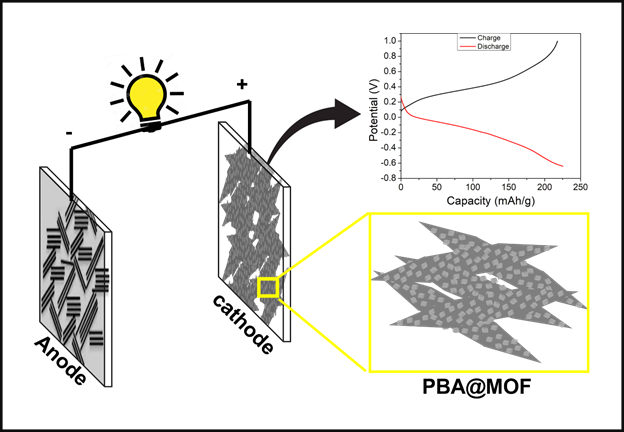
Prussian Blue Analogs Nanocubes Supported on MOF Derived Ni/Fe Oxides@C Nanorods as High-Capacity Cathode Material for Sodium Ion Batteries (SIBs)
Abstract:
Since rechargeable lithium-ion batteries have dominated the mobile electronics market for the last decade, they are unable to gain widespread commercial accomplishment in high-capacity and high-power applications. Industry and academia alike are struggling to develop a battery capable of meeting the growing demand for safe, long-lasting high energy-density storage systems. Such systems could assist in expediting a smooth transition to an electrified transport system and enable intermittent renewable energy resources, both of which have been gaining attention in our increasingly carbon-constrained environment. There is an ever-growing demand for the next generation of electrode materials to meet such requirements in a cost-effective and promising manner. Aqueous rechargeable sodium-ion batteries are a cost-effective and environmental friendly alternative to expensive and hazardous lithium-ion batteries due to the excessive availability of sodium, its low cost, and the similarity of both Li+ and Na+ insertion chemistry. However, challenges in developing the needed electrode materials for the reversible Na+ insertion process impede their progress. These include low specific capacity, quick fading capacity upon battery cycling, and short shelf life.
Keeping the aforementioned challenges in view, we are working on the development of new cathode material by supporting nanocubes of Prussian blue analogs. Prussian blue analogs (PBAs) are potential cathode materials for sodium-ion batteries because of their open channel structure, composition, and electrochemical tunability. Their distinct crystal structure, which includes open 3D frameworks and significant interstitial gaps, promotes quick Na+ intercalation without producing severe volume expansion, requiring high-rate and long-term battery operation. MnCoPBA on the surface of highly conducting MOF-derived Fe/Ni oxides is the desired composite material expected to have a high reversible capacity, high-rate capability, and excellent cyclability. The progress made in this regard will be presented in this seminar.
Thesis Committee
- Dr. Irshad Hussain (Supervisor)
- Dr. Salman Noshear Arshad (Thesis committee member)
- Dr. Muhammad Shoaib (Thesis committee member)

